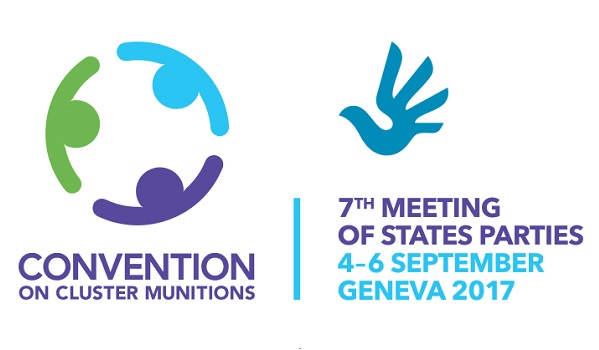At the Seventh Meeting of States Parties to the Convention on Cluster Munitions, which took place in Geneva this week, States Parties condemned all use of cluster munitions by any actors, including the continued use in Syria and Yemen. Good news from the meeting came from South Sudan, which announced it will accede to the Convention. Sri Lanka announced its intention to accede in the near future.
States condemn all use of cluster munitions, number of victims doubled in 2016
In statements made during the plenary sessions and in the final document adopted by the meeting, the states present “expressed their strong concern regarding recent incidents and evidence of use of cluster munitions in different parts of the world” and “condemned any use by any actor”. These condemnations follow reports of continued use of cluster munitions, notably in Syria, and of rising numbers of victims from cluster munitions.
Good news from the meeting came from South Sudan, which announced it will accede to the Convention, thereby becoming its 103rd State Party. 17 other States have signed but not yet ratified the treaty. Sri Lanka announced its intention to accede in the near future.

The delegate of South Sudan making the statement about the country’s accession to the CCM
Peru: investment in cluster munitions producers prohibited
Another positive development was the interpretive statement delivered to the plenary by Peru, which issued the statement that it considers investments in cluster munitions producers to be prohibited under the CCM:
“Peru (…) understands the interpretation of Article [1]1.c of the Convention (…) includes a prohibition in the investments in cluster munitions, that is to say, provide financial assistance to producers of such weapons.“
The Stop Explosive Weapons campaign welcomes the statement by Peru. This type of statements strengthens the international norm that investment in producers of cluster munition producers are prohibited under the Convention. Please refer to our 2017 update of the Worldwide Investment in Cluster Munitions report for reference to 38 other States that have expressed the view that investment are or should be prohibited. The report also shows how these statements have contributed to the reduction of investments in cluster munition producers.
The full text of the interpretive statement by Peru (in Spanish) is available here.
Stop Explosive Investments side event

The panel at the side event: (l-r) Mr. Gabriëlse, Mr. Hannon, Ms. Docherty, Ms. Claringbould, Mr. Uiterwaal
On Wednesday, PAX, the Cluster Munition Coalition and the Permanent Mission of the Netherlands in Geneva jointly hosted a side event about investments in producers of cluster munitions, and the steps that states, financial institutions and citizens can take to end those investments.
Mr. Rob Gabriëlse, Disarmament Ambassador of the Netherlands in Geneva, in his word of welcome, stressed how imporant it is to also focus on divestment from cluster munition producers, as a means of stopping these weapons to be produced. The event was moderated by Mr. Paul Hannon, Exuctive Director of Mines Action Canada, who provided insightful comments on his advocacy work, and specifically on how to raise the issue of divestment in national legislation.
Ms. Bonnie Docherty, professor at Harvard University and senior researcher at Human Rights Watch, discussed how national statements and legislation can build legal norms indicating that the prohibition of assistance encompasses financing. She detailed how this can be an effective way to reduce investments in producers of cluster munitions. Ms. Sachi Claringbould, deputy permanent representative of the Netherlands to the conference on disarmament, informed the audience on the Dutch national legislation and how it prohibits investments in cluster munition producers. She also called on States Parties to prohibit investments in cluster munition producers. Mr. Michel Uiterwaal of PAX presented key findings of the 2017 update of the World Wide Investment in Cluster Munitions. In his presentation he detailed how ending investment in producers of cluster munition does have effect even in states not yet party to the Convention on Cluster Munition. An interesting discussion followed with States delegates and members of NGOs alike on several aspects of divestment.
A briefing paper for states on the issue of investments in cluster munitions producers is accessible here.

